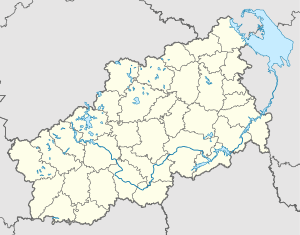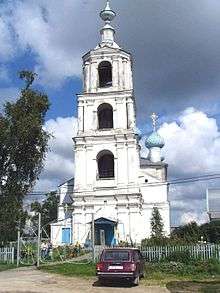Kesova Gora
| Kesova Gora (English) Кесова Гора (Russian) | |
|---|---|
|
- Urban-type settlement[1] - Work settlement[1] | |
 The center of Kesova Gora | |
.svg.png) Location of Tver Oblast in Russia | |
 Kesova Gora | |
|
| |
| Administrative status | |
| Country | Russia |
| Federal subject | Tver Oblast[1] |
| Administrative district | Kesovogorsky District[2] |
| Administrative center of | Kesovogorsky District[2] |
| Municipal status (as of February 2010) | |
| Municipal district | Kesovogorsky Municipal District[3] |
| Urban settlement | Urban Settlement Kesova Gora[3] |
| Administrative center of | Kesovogorsky Municipal District, Urban Settlement Kesova Gora[3] |
| Statistics | |
| Population (2010 Census) | 3,877 inhabitants[4] |
| Time zone | MSK (UTC+03:00)[5] |
| Kesova Gora on Wikimedia Commons | |
Kesova Gora (Russian: Ке́сова Гора́) is an urban locality (an urban-type settlement) and the administrative center of Kesovogorsky District of Tver Oblast, Russia, located 32 kilometers (20 mi) from Kashin and 50 kilometers (31 mi) from Bezhetsk. Population: 3,877 (2010 Census);[4] 4,076 (2002 Census);[6] 4,208 (1989 Census).[7]
History
Kesova Gora was known since approximately 1238, and it apparently was formed from a combination various smaller settlements: Krasny, Zaychy, and Grachi. Originally, the settlement was called Kyasova Gora, meaning "clay-filled region" in Finnish. For a long time, it was a votchina of the Prozorovsky noble family. One of the most important landmarks of the settlement is the still-functioning Saint Nicholas Church.[8]
In the course of the administrative reform carried out in 1708 by Peter the Great, Kesova Gora was included into Ingermanland Governorate (known since 1710 as Saint Petersburg Governorate), but in 1727 it was transferred to Moscow Governorate. In 1775, Tver Viceroyalty was formed from the lands which previously belonged to Moscow and Novgorod Governorates. Kesova Gora was a part of Kashinsky Uyezd of Tver Viceroyalty.[9] In 1796, Tver Viceroyalty was transformed into Tver Governorate. On October 3, 1927 Kashinsky Uyezd was abolished; Kesova Gora was transferred to Bezhetsky Uyezd.[10]
On July 12, 1929 the governorates and uyezds were abolished. Kesovsky District, with the administrative center in Kesova Gora, was established within Bezhetsk Okrug of Moscow Oblast. Shortly afterwards, the district was renamed Kesovogorsky. On July 23, 1930, the okrugs were abolished, and the districts were directly subordinated to the oblast. On January 29, 1935 Kalinin Oblast was established, and Kesovogorsky District was transferred to Tver Oblast. On February 13, 1963, during the abortive Khrushchyov administrative reform, Sonkovsky District was merged into Bezhetsky District, but on January 12, 1965 it was re-established.[10] In 1975, Kesova Gora was granted urban-type settlement status.[11]
Economy
Industry
Kesova Gora's economy is primarily agriculture-based. There is also a bread-making factory, a linen factory, and a milk and meat packing company in the settlement.[9]
Transportation
The main form of transportation in the settlement is the passenger train which makes a stop at the historic wooden town train station (constructed in 1895) two or more times a day. The train travels from nearby Sonkovo to Savyolovo, and back. A more frequent bus service is also available in the area, but it only travels to closer locations. A road that travels from Kashin to Bezhetsk also passes through the settlement.
Culture and recreation

Kesova Gora contains one cultural heritage monuments of federal significance and additionally two objects classified as cultural and historical heritage of local significance. The federal monument is the Saint Nicholas Church (1770s) whereas the local monuments are the Transfiguration Church (1800) and the monument to Aleksey Alelyukhin, a military pilot and double Hero of the Soviet Union, who was born in Kesova Gora.[12]
There is a local museum in Kesova Gora.[11]
References
Notes
- 1 2 3 Law #34-ZO
- 1 2 Государственный комитет Российской Федерации по статистике. Комитет Российской Федерации по стандартизации, метрологии и сертификации. №ОК 019-95 1 января 1997 г. «Общероссийский классификатор объектов административно-территориального деления. Код 28 251 551 1», в ред. изменения №259/2014 от 12 декабря 2014 г.. (State Statistics Committee of the Russian Federation. Committee of the Russian Federation on Standardization, Metrology, and Certification. #OK 019-95 January 1, 1997 Russian Classification of Objects of Administrative Division . Code 28 251 551 1, as amended by the Amendment #259/2014 of December 12, 2014. ).
- 1 2 3 Law #28-ZO
- 1 2 Russian Federal State Statistics Service (2011). "Всероссийская перепись населения 2010 года. Том 1" [2010 All-Russian Population Census, vol. 1]. Всероссийская перепись населения 2010 года (2010 All-Russia Population Census) (in Russian). Federal State Statistics Service. Retrieved June 29, 2012.
- ↑ Правительство Российской Федерации. Федеральный закон №107-ФЗ от 3 июня 2011 г. «Об исчислении времени», в ред. Федерального закона №271-ФЗ от 03 июля 2016 г. «О внесении изменений в Федеральный закон "Об исчислении времени"». Вступил в силу по истечении шестидесяти дней после дня официального опубликования (6 августа 2011 г.). Опубликован: "Российская газета", №120, 6 июня 2011 г. (Government of the Russian Federation. Federal Law #107-FZ of June 31, 2011 On Calculating Time, as amended by the Federal Law #271-FZ of July 03, 2016 On Amending Federal Law "On Calculating Time". Effective as of after sixty days following the day of the official publication.).
- ↑ Russian Federal State Statistics Service (May 21, 2004). "Численность населения России, субъектов Российской Федерации в составе федеральных округов, районов, городских поселений, сельских населённых пунктов – районных центров и сельских населённых пунктов с населением 3 тысячи и более человек" [Population of Russia, Its Federal Districts, Federal Subjects, Districts, Urban Localities, Rural Localities—Administrative Centers, and Rural Localities with Population of Over 3,000] (XLS). Всероссийская перепись населения 2002 года [All-Russia Population Census of 2002] (in Russian). Retrieved August 9, 2014.
- ↑ Demoscope Weekly (1989). "Всесоюзная перепись населения 1989 г. Численность наличного населения союзных и автономных республик, автономных областей и округов, краёв, областей, районов, городских поселений и сёл-райцентров" [All Union Population Census of 1989: Present Population of Union and Autonomous Republics, Autonomous Oblasts and Okrugs, Krais, Oblasts, Districts, Urban Settlements, and Villages Serving as District Administrative Centers]. Всесоюзная перепись населения 1989 года [All-Union Population Census of 1989] (in Russian). Институт демографии Национального исследовательского университета: Высшая школа экономики [Institute of Demography at the National Research University: Higher School of Economics]. Retrieved August 9, 2014.
- ↑ История района (in Russian). Administration of Kesovogorsky District. Retrieved 26 August 2013.
- 1 2 Иванюшкин, Роман. Кесова Гора (in Russian). Савёловская Глухомань. Retrieved 26 August 2013.
- 1 2 Справка об изменениях в административно-территориальном делении Тверской губернии - Калининской области (in Russian). Архивы России. Retrieved 21 August 2013.
- 1 2 Кесова Гора и Кесовогорский район (in Russian). Литературная карта Тверского края. Retrieved 21 August 2013.
- ↑ Памятники истории и культуры народов Российской Федерации (in Russian). Russian Ministry of Culture. Retrieved 2 June 2016.
Sources
- Законодательное Собрание Тверской области. Закон №34-ЗО от 17 апреля 2006 г. «Об административно-территориальном устройстве Тверской области», в ред. Закона №66-ЗО от 1 октября 2014 г. «О внесении изменения в статью 18 Закона Тверской области "Об административно-территориальном устройстве Тверской области"». Вступил в силу со дня официального опубликования. Опубликован: "Тверские ведомости", №17 (специальный выпуск), 19 апреля 2006 г. (Legislative Assembly of Tver Oblast. Law #34-ZO of April 17, 2006 On the Administrative-Territorial Structure of Tver Oblast, as amended by the Law #66-ZO of October 1, 2014 On Amending Article 18 of the Law of Tver Oblast "On the Administrative-Territorial Structure of Tver Oblast". Effective as of the official publication date.).
- Законодательное Собрание Тверской области. Закон №28-ЗО от 28 февраля 2005 г. «Об установлении границ муниципальных образований, входящих в состав территории муниципального образования Тверской области "Кесовогорский район", и наделении их статусом городского, сельского поселения», в ред. Закона №20-ЗО от 13 апреля 2009 г. «О внесении изменений в Приложение №1 к Закону Тверской области "Об установлении границ муниципальных образований, входящих в состав территории муниципального образования Тверской области "Кесовогорский район", и наделении их статусом городского, сельского поселения"». Вступил в силу со дня официального опубликования. Опубликован: "Тверские ведомости", №10, 11–17 марта 2005 г. (Legislative Assembly of Tver Oblast. Law #29-ZO of February 28, 2005 On Establishing the Borders of the Municipal Formations Comprised by the Territory of the Municipal Formation of "Kesovogorsky District" and on Granting Them the Status of Urban, Rural Settlements, as amended by the Law #20-ZO of April 13, 2009 On Amending Appendix 1 of the Law of Tver Oblast "On Establishing the Borders of the Municipal Formations Comprised by the Territory of the Municipal Formation of "Kesovogorsky District" and on Granting Them the Status of Urban, Rural Settlements". Effective as of the day of the official publication.).